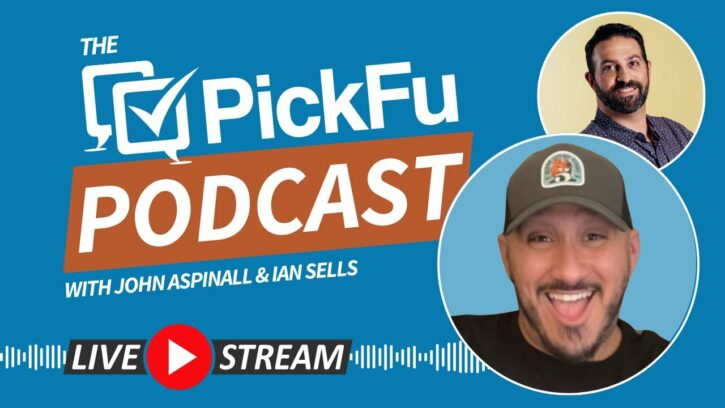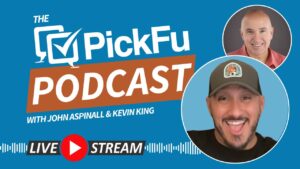In the latest episode of The PickFu Podcast, host John Aspinall talked to special guest Ian Sells. Ian has over a decade of e-commerce experience, has founded or helped grow several successful brands, and is the founder of Million Dollar Sellers, a community of Amazon and e-commerce entrepreneurs generating between $1MM and $500MM per year.
In the live episode, John and Ian dove into trends, best practices, and tools for succeeding in the e-commerce space – including taking advantage of user-generated content (UGC), tapping into the potential of TikTok Shop, and using consumer feedback to make data-driven decisions.
Watch the full episode here, or you can just grab the key takeaways below.
Understanding the power of UGC
User-generated content (UGC) has become increasingly important for e-commerce businesses. It provides authenticity, builds trust with potential customers, and can significantly impact purchasing decisions.
Here are some key points about UGC:
- UGC can take various forms, including images, videos, reviews, and testimonials from real customers.
- It helps potential buyers visualize how a product looks and performs in real-life scenarios.
- UGC can be leveraged on e-commerce platforms like Amazon, as well as social media channels like TikTok and Instagram.
- Businesses can collaborate with influencers, creators, and loyal customers to generate UGC for their products.
As Ian noted, “When I’m searching for stuff like a kitchen spatula, I might go to Amazon, I’m in TikTok and search kitchen spatula or best kitchen spatula. And then check out videos of people saying this is the best kitchen spatula because it’s nonstick… That’s how people shop now.”
TikTok Shop: the next big thing in e-commerce?
TikTok has rapidly emerged as a powerful platform for product discovery and e-commerce. Here’s why businesses should pay attention to TikTok Shop:
- TikTok’s algorithm is highly effective at surfacing content and products that resonate with users’ interests.
- Viral TikTok trends often lead to spikes in product sales on platforms like Amazon.
- Businesses can leverage TikTok Shop to showcase their products through engaging videos, collaborating with creators, and utilizing relevant hashtags.
- TikTok Shop offers an affiliate program, allowing creators to earn commissions on product sales they drive.
“When things go viral on TikTok, your Amazon sales go viral as well,” Ian explained. “They spike up dramatically because a lot of people want to shop where they already have their credit card.”
Using PickFu polls to make data-driven decisions
PickFu is a powerful tool that allows e-commerce businesses to gather valuable insights from real audiences. During the podcast, John showed how PickFu polls can be used to:
- Test product packaging designs, images, and videos to determine which resonates best with the target audience.
- Evaluate the effectiveness of influencer/creator content and determine which creators are most likely to drive conversions.
- Gather feedback on product ideas, features, and potential pivots to inform future product development.
- Analyze audience demographics and preferences to refine marketing strategies and messaging.
Brands who are selling on TikTok can also use PickFu to test and optimize their product videos, including influencer choice, text/titles, music/voiceover, and more. Here’s an example of a poll asking an audience of TikTok users to choose which content creator they’re drawn to most.
Here’s another TikTok poll example, this time using an Open-Ended poll to ask the panel to watch a TikTok video and then share whether they would purchase from the creator. A few of the audience comments included:
- “Yes I would purchase from her. I think that she seemed reliable and sincere. I felt like she wasn’t trying to sell just any product. I think that she used it and it worked for her and she wants to help others like her out.”
- “Nothing wrong with the creator and she does very well expressing her issues with eczema however, I’m just not comfortable buying from creators. I prefer to go through stores like Amazon where I do have options for returning or credit if the product is not satisfactory to me.”
- “To me, she keeps her eyes closed when she talks too much. I don’t really trust people that have to do that since it’s a sign of deception (I’m one of those analyzing people). The rest of the content on her page seems like all she does is shill products. I get the feeling she’s a sponsorship hound and doesn’t really care how it affects people as long as she gets paid for it.”
- “After seeing the TikTok video showcasing the effectiveness of the “The ocean healed my eczema” product, I would indeed consider purchasing items from this designer. The testimonials from satisfied customers, particularly the mention of 60.000 units sold, provide a strong testament to its efficacy. The fact that it’s specifically formulated for eczema and psoriasis-prone skin is reassuring, as it suggests a targeted approach to skincare concerns. Additionally, the affordability factor mentioned in the video, with coupons bringing the price down to $12, makes it accessible for those seeking relief from such skin conditions. Overall, the combination of positive reviews, targeted formulation, and affordability makes it a compelling choice for anyone dealing with eczema or psoriasis.”
Finally, John shared another poll example testing beer packaging designs, targeting a built-in panel of beer drinkers in the U.S. Audience comments included:
- “I like this one as the color and design just pop out for me and get my attention right away.”
- “I prefer choice B because the design is more exciting. Stands out more on the shelves.”
- “Option B looks more fun and interesting. Option A looks like a red bull design – sort of.”
- “I like B best because it’s fun and entertaining. Very nice colors. A is harsh and looks for only a very specific crowd, like goth or alt or heavy metal. While I like that crowd, it’s not something I want everyday aesthetically.”
Some key benefits of using PickFu polls include:
- Access to a diverse audience panel, allowing businesses to target specific demographics and traits
- Ability to gather qualitative feedback and insights, in addition to quantitative data
- Quick turnaround times, enabling businesses to make informed decisions quickly
- Cost-effective compared to traditional market research methods
As John emphasized: “Your CEO or creative director doesn’t know best – data knows best.”
Best practices for e-commerce success
Throughout the podcast, Ian and John shared several best practices for e-commerce businesses:
- Always be testing: “You should continue to test and see if you can continue to improve your conversion rates, your reviews, your imagery,” Sells advised.
- Understand your audience: Know your target audience intimately, including their preferences, pain points, and purchasing behaviors, to create more effective messaging and campaigns.
- Leverage multiple platforms: Don’t rely solely on a single platform like Amazon or TikTok. Diversify your presence across multiple channels to reach a wider audience and mitigate potential risks.
- Embrace authenticity: Consumers crave authenticity, so prioritize UGC and genuine creator partnerships over overly polished, staged content.
- Be data-driven: Use tools like PickFu to gather real-world data and insights from your target audience, rather than relying solely on gut instincts or assumptions.
By implementing these best practices and leveraging the power of UGC, TikTok Shop, and PickFu polls, e-commerce brands can stay ahead of the curve, make informed decisions, and drive sustainable growth.
You can watch the full episode here for more insights from Ian, and follow our YouTube and LinkedIn pages to catch future episodes – we go live every Thursday at 12pm Eastern with a new guest!





